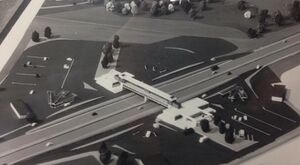Unsuccessful Developers

While operators who no longer exist have their history listed in detail in the Operators section, there are some who only exist on paper, as they never made it off the ground.
Note that almost all applications were made under the company's formal name, and in most cases a trading name would have been developed before the service area opened.
Building Agreement Applications
The following developers applied to build one of the Ministry's proposed services, but were unsuccessful. Reasons are detailed on each service area's page.
The original firms surveyed are not included here, and neither are firms who asked to be involved but never produced a service area plan. This list is not complete.
Airborne Catering Ltd
The company responsible for the catering at Gatwick made a number of bids to operate the early services. Despite their poor plans and worrying finances, with every bid they got more ambitious, but were still always outbid.
They bid for:
- Burton-in-Kendal
- Charnock Richard
- Farthing Corner
- Keele
- Knutsford
- Newport Pagnell
- Strensham
- Watford Gap
Their architect was Sydney Clough, Son & Partners, who worked on successful projects at Knutsford, Medway and Newport Pagnell.
Banquets of Oxford Ltd
The Forton bid was made under the name 'Banquets Catering Ltd'.
British Electric Traction Investments Ltd
Usually written as B.E.T. Ltd. At the time, BET operated a bus company, giving them transport experience, but they also operated Associated-Rediffusion, who had a partnership with Granada's television division.
Their subsidiary, Potteries Motor Traction Co. Ltd, bid unsuccessfully for Keele.
Hanover Grand Ltd
Normand Ltd (J Lyons)
Oliver Hart
Property Investments Consolidation
Regent Oil
W. Blamire
Developers who only bid once
- A S Mallin: Watford Gap
- AVP Industries Ltd: Scratchwood
- Blackburn & Son Ltd: Rownhams
- Cohen & Wilks: Strensham
- Fosse Motor Company: Leicester Forest East
- Grand Metropolitan Motorway Service: Scratchwood. Possibly related to Grand Metropolitan, the owners of Mecca Leisure, who built Trowell and planned Hilton Park
- J Davy Limited (The J Davey Group of Companies): Watford Gap
- John Jordan: Newport Pagnell
- John Willment Automobiles: Heston
- Kenwell Motor Services: Leicester Forest East
- Knutsford Motors Ltd: Watford Gap
- Loxhams Garage: Charnock Richard
- Manor Holdings Ltd: Sandbach
- Messrs Wildman & Partners (W. Wildman): Newport Pagnell
- Penn Motor Services Ltd: Strensham
- R. H. Banks Esq: Toddington
- Shadsworth Garage Ltd: Charnock Richard
- Smerhursts: Aust (withdrawn)
- Telefusion Ltd: Forton
- Warners Holiday Camps Ltd: Watford Gap
- Whatley Transport Ltd: Strensham
- W.H. Turner Properties: Heston
Private Developers
Since service areas were deregulated, private developers would often plan their own service areas, in the hope their successful plan would be taken up by an operator. It can therefore be assumed most of these would have gone on to be owned by a mainstream operator - but maybe not.
- A&L Basson: Hook
- Adamstan Holdings Ltd: Frodsham
- Argent Group, Dashswivel: Hill Hall
- Avalon Enterprises: Great Wood
- Belgrave Holdings: Curdworth
- Bushwing Plc: Chester, Winwick
- Bryant Central: Brockworth
- Cameron Hall Developments Ltd: Rossington
- Cape Plc: Woodlands Park, Elk Meadows
- Caswell Contracting: Elk Meadows
- Chantry Property Development: Hill Hall
- Chartergate Estates Ltd: Barton Park
- Corporate Land Ltd: Woodlands Park
- Hadmere Ltd: Chertsey
- Hallam Land Management: Bramham Crossroads, Bridgwater, Great Hazes, Hedgerley, Lutterworth, Redbourn, Tibshelf
- Heather Ive: Kirby Hill
- J F Oram: Waltham Abbey
- J Rowland: Theydon Mount
- Laser Properties Ltd: Waltham Abbey
- Lawlor Land Plc: Ickleton, Pedham Place, Warren Farm
- Manchester Ship Canal Company: Woolston
- Oakstead Developments Ltd: Hedgerley
- P F McCall: Stumps Cross
- Petromar: Walton Summit
- S Notaro Land Ltd: Huntworth
- Shirley Estates (Developments) Ltd: Solihull
- South East Oil Co: Tibshelf
- Stansford Holdings: Maidenhead
- Three Kings: Folkestone
- Tucker Parry Knowles: Wootton Bassett
- William Davis: Hadzor
- Wyatt Bros: Waterstock